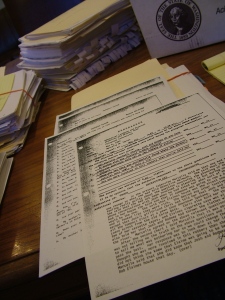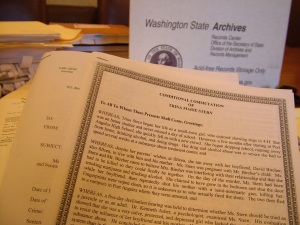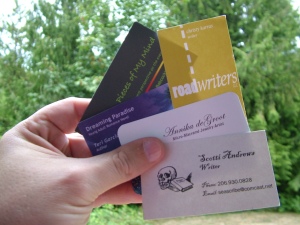My way is to just be there and see what happens. A lot of the big breaks I got happened just because of that. But you have to have a good intuitive sense about dealing with people. You have to figure out where they’re coming from and be empathetic. … A lot of times you only have thirty seconds to get across and connect with them, but you have to be there for those situations to occur. You cannot go in with a list of questions. You have to let things evolve. That’s what kills journalists who try these books. You have to have a relationship and go back four, five, six times before someone will talk to you; it can’t be fifteen questions and out the door. You have to let them go where they want in a conversation.
— True-crime author Harry MacLean, in Writing Bestselling True Crime and Suspense, by Tom Byrnes
Boy, did I ever screw that one up.
One of the hardest jobs a true-crime writer has, I imagine, is trying to convince people to talk.
You can probably guess all the reasons a potential source for a true-crime book has to dodge a writer in pursuit of an interview (and for a book-length project, I gather that it’s more like a mutually co-dependent relationship). Guilt, for one. Shame or embarrassment for having been associated with guilty people, for another. Desire to put horrific events behind them, certainly.
And, for a good many with whom I personally have dealt, an inability to see how they benefit from spilling their secrets.
(Ironically, the criminals themselves are often the easiest to get on board. At least in my experience. Mostly that’s because their fifteen minutes in the mainstream media came and went a long time ago, or never came at all. If they’re in prison, they’re generally bored out of their gourds and hungry for attention.)
Initial mistrust is the thread that connects all these passive motives, as I see it. Because, after 24 years in newspaper journalism, I firmly believe that everybody wants to talk. They’re just saving what they have to say for the right audience. An audience they can trust.
So it’s my job to be that right audience. Hopefully with a minimum of professional manipulation. (My favorite is: “Well, I have enough to write your story based on all the court and police documents I’ve been able to gather. It would just be a much better story if you gave your side of things.” That one works a lot. Mostly because it’s absolutely true. Does that mean it’s still manipulation?)
Just like with dating or job interviews, often you get only one chance to make a good impression.
Recently, I learned I was lucky enough to get a second chance … nearly five years after I’d blown the first one.
Here’s the story (with some details deliberately smudged because it’s my story, dammit … it’s my story!):
In 2003, while I was the editor of the newspaper in Gig Harbor, a town near Tacoma that’s next door to the Washington Corrections Center for Women, I went to the prison to report on a story about a Thanksgiving event for inmates and their families.
There, I struck up a lengthy conversation with a young woman — first, for the story and then about her personal history. This blonde, petite, waifish woman of 23, who looked for all the world like a teenager, had just entered her eighth year of imprisonment for first-degree murder.
I had to look up the story later, as she didn’t want to tell it to me in detail then and there. As a 15-year-old, she had run away from home to her boyfriend’s home. And she and her boyfriend planned to run away, out of town, together. But his mother found out about it, and tried to put a stop to it.
So they killed her.
Caught a few days later, both were tried as adults because the juvenile courts declined jurisdiction. The conviction was a slam-dunk; he got 28 years in prison and she got 23 years and 8 months.
And that was that. Except that her parents, with the help of an attorney, felt that the adult court in her county wrongly superseded the juvenile court’s jurisdiction in her case. But she was out of appeals, and so the only way she could air that argument was before the governor’s Clemency and Pardons Board.
She did so, by conference call from the prison, in a 2004 hearing in Olympia that I attended. (And, I noted with some surprise, I was the only journalist in attendance. By default, the story was mine.)
About sixty of her supporters were present; nobody was there representing the victim’s family. (According to the board’s rules, it’s incumbent on the people petitioning for clemency to make a good-faith effort to find people on both sides. Cherry-picking the facts and the people who are notified can wind up backfiring on the petitioners in the governor’s office. if opponents to the petition surface after the hearing.)
Before a packed room, over three hours, the five-member board wrestled with the case. Some, as you might guess, couldn’t get past the fact of murder, and certainly not after just eight years. Others were moved by her spotless record in prison and were troubled by the fact that she had been skipped over by the juvenile justice system — in what smelled to some like a backroom deal with a politically sensitive prosecuting attorney.
In the end, the board members made a decision I haven’t witnessed since. They decided that letting her out after eight years was too soon. But, a majority reasoned, ten years would be all right. So they voted to recommend to the governor that she be let out in the fall of 2006.
I took pictures of the hugs shared by family and friends, and wrote two long articles for her hometown newspaper — one about the hearing, another rehashing the crime.
The shit hit the local fan.
Friends and family members of the victim stepped forward. They made noise, they wrote angry letters to the editor, they circulated petitions in opposition to the clemency, for the governor’s consideration. More than 1,000 people signed.
As the months passed with no word from the governor, my relationship with the family deteriorated. I had talked to them about the possibility of writing a book even then, and we even sat around their kitchen table one morning to lay the groundwork for the project. But they eventually froze me out, ignoring most of my phone calls and e-mails.
Nearly six months after the hearing, the mother sent me a withering note. My stories, she felt, had the effect of swinging a stick at a nest of sleeping hornets. Now they were buzzing everywhere, and buzzing angrily. She and her husband had been confronted numerous time around town. Now, she feared, the governor would recoil in the face of all this eleventh-hour outrage and overturn the recommendation from his handpicked board.
In short, they didn’t trust me, didn’t feel that I wasn’t on their team, didn’t want to work with me any more. And didn’t want to talk to me anymore.
I later wrote a letter to the young woman herself (by then, I’d left the Gig Harbor paper and had thus lost my ready access to the prison). Her reply was polite, but she made it clear that she was putting all matters in the hands of her parents, who had spearheaded her clemency bid, and was letting them speak for her. So that door shut in my face as well.
Now, I felt bad about this. But I also felt bad about feeling bad. After all, ethically, I did nothing wrong. It wasn’t my job to be on their “team.” My stories were accurate. And I can’t be forced to feel responsible for how other people receive them.
And yet , I still felt bad. Guilty. Of a certain, I don’t know … myopia, I guess. I wanted to write a book, yes, but I also wanted the satisfaction of the quick score. I was a full-time freelance writer in those days, and it was hard to see past the next story and the next buck. The long term for me was the next week. I needed to keep gas in my tank and food on my table, not worry about a career that was halfway in the crapper.
But imagine how many true-crime book writers would be able to maintain their access to their sources if they wrote articles in newspapers or magazines after each development or each interview. Not long, is my guess. These stories, as good as they may be, lack the full context and nuanced perspective of a book-length dissection of events. And sources, as unsophisticated as they are, know this intuitively, I imagine. And as they say, you can shear a sheep many times, but skin them only once.
So, reluctantly, I let it go. I let them go.
A few months later, in early 2005, I got the word from my contact in Gov. Gary Locke’s office: The governor had upheld his board’s recommendation. The young woman was granted clemency. She would be freed in the fall of 2006.
I wrote my last newspaper article on the subject. A few weeks later, I was hired for the full-time newspaper job I still hold today, and moved on. But the young woman’s story never really left me.
So, late last year, when I conceived of the idea of writing a book that collected some of the most dramatic stories of crime, punishment and redemption that came through the Clemency and Pardons Board, it was the young woman’s story that first came to mind. But I admit I was intimidated to try to find her, to approach her and her family. And I needed to look at her file again, and I had other stories I could dive into immediately. So I put in my request for the file, knowing it would probably take months to fulfill, and went to work on the other stories.
Nearly two weeks ago, the young woman’s file was finally ready for me to review. And when I did, I realized that her story was even better than I thought it would be. For the first time, I saw the ferocious extent to which the people opposed to her clemency stated their case. Dozens of letters. Dozens of petitions, all filled to the bottom of each page with signatures. I’d love to know how Gov. Locke — now the U.S. Secretary of Commerce — came to see past that justified outrage and decided to grant clemency. (I suspect that’s one interview I’m not going to get, however. But you know what? I’m going to try anyway.)
So, sitting there in the governor’s conference room — now belonging to the current governor, Christine Gregoire — I closed the case file and realized it was time to try to renew the connection with the young woman and her family. Nearly five years had gone by. Nearly three years since she had gotten out of prison, if everything had gone according to Hoyle. Which, I realized, I had no idea if they actually had.
All I had was the same e-mail address and mailing address I had in 2004. But it was better than nothing, so I gave it a shot. I figured the chances were better than 80 percent that I’d either get no response at all, or get my missives bounced back to me.
I’m glad I didn’t play those odds at Emerald Downs, however. Because the mother replied to me a few days ago.
The e-mail read, in part:
Your book idea sounds like a very good one. I think it is a subject that should be told. I am also sure that we could add some very valuable information about our journey through the prison system and the clemency process. There are very few cases that turn out the way hers did and we are very grateful for that. … I have told her about your project and she said that she would think about it. She really wants to leave the past in the past but if it can help her to move on, emotionally and/or financially, I would encourage her to do so.
Knowing how much influence the mother has historically had over her daughter, I took this a very good sign indeed. I responded the next day, and we’re arranging a meeting — mother, father, daughter and me — sometime in the next few weeks.
I’ll keep you posted. Or should I? Do I risk making the same mistake twice by blogging about it … even if I name no names?





